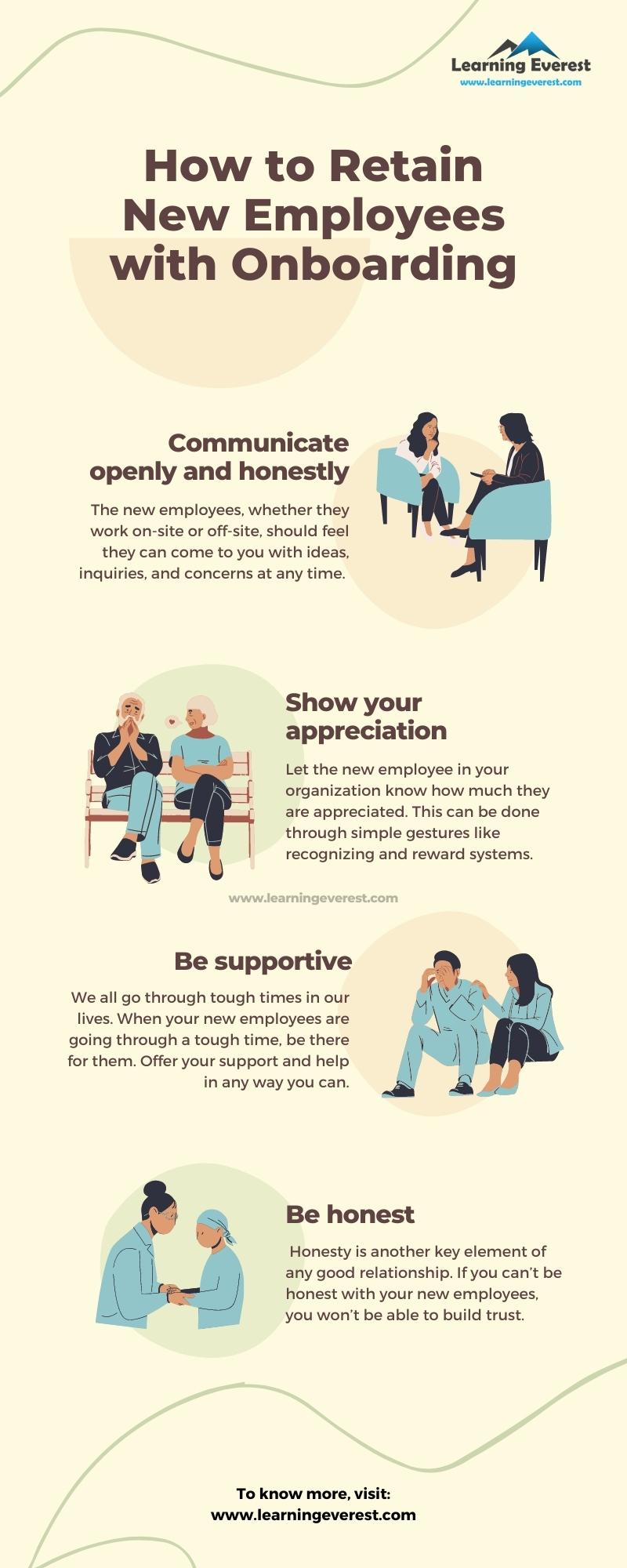Need to retain new employees effectively? Organizations with a standardized onboarding program experience 62% greater new employee productivity and 50% greater new employee retention. If you want to retain employees, ensure that a new employee’s organizational, technical, and social needs are met. Here are a few areas where deliberate effort can help increase employees’ job satisfaction and improve your capability to hold onto valued employees during onboarding
Table of Contents
Here are 11 Strategies to Retain New Employees for a Long Time with Effective Onboarding
1. Mentorship programs
Providing a new employee with a mentor significantly improves the extended onboarding program, especially in remote work culture. A Mentor can welcome new employees into the organization, offer guidance, and be a sounding board. New team members learn their job roles from experienced employees, and, in return, they also provide a fresh viewpoint to their mentors.
2. Communication
The transition to hybrid and remote work has highlighted the significance of good workplace communication. The new employees, whether they work on-site or off-site, should feel they can come to you with ideas, inquiries, and concerns at any time. As a recruiter, you must ensure you do your part by providing constructive and positive communication across the entire team. Ensure you proactively connect with each team member regularly to get a sense of their job satisfaction.
3. Perks
With perks, your workplace can stand out to potential new employees and re-engage current staff while boosting employee morale. For example, flexible programs and remote work options are the benefits that many professionals value most. New employees need to know that their recruiters know that they have lives outside of work — and acknowledge that keeping balance can be even more difficult when working from home. This can help reduce stress for your new employees and boost employee retention.
4. Wellness offerings
Keeping employees fit mentally, physically, and financially is important. Many leading organizations expanded and improved their wellness offerings to help new employees feel encouraged and prioritize their health. Stress management sessions, retirement planning services, and reimbursement for fitness sessions are just some instances of what your business might consider providing to new employees.
5. Employee compensation
Companies must pay their employees competitive compensation, meaning employers must evaluate and adjust salaries regularly. Even if your business cannot increase the pay, consider whether you can provide some other kinds of compensation, such as bonuses. Do not ignore enhancing health care benefits and retirement schemes, which can help raise employees’ job satisfaction.
6. Continuous feedback on performance
Many recruiters are now abandoning the annual and quarterly performance reviews in favor of regular individual meetings with team members. In these one-on-one meetings, discuss with your new employees their long-term professional goals and help them see their future with the organization. While you should never make promises you cannot keep, talk through potential career improvement scenarios and lay out a realistic strategy for reaching those goals.
7. Training and development
You should assist employees in identifying areas for professional growth, such as the need to upskill. Upskilling new employees is essential as technology changes how we work. People upskill and gain new capabilities and competencies as business requirements change. Prioritize investing in your employee’s professional growth. Give them time to join virtual conferences, provide training, or pay for continuing education.
8. Recognition and rewards systems
Everyone wants to be appreciated for the work they do. So be sure to thank your new employees who go the extra mile and describe how their hard work benefits the organization. Some organizations set up formal and informal reward systems to incentivize great ideas and innovation.
9. Effective change management
Every workplace must deal with change, good and bad. And new employees look to leadership for insight and reassurance. If your organization is going through a considerable shift, keeping your new employees as informed as possible helps. Make big announcements individually or in a group meeting, and allow them time for inquiries and questions.
10. An emphasis on teamwork
It will help if you encourage all your new employees to contribute ideas and solutions. Promote teamwork by creating possibilities for collaboration, accommodating individuals’ working styles, and offering everyone the space to make decisions and course modifications if required. Also, try to include the new employee in celebrations. Even if you need to celebrate remotely, it can be a memorable moment for them.
11. Social Onboarding
Build a sense of community. New employees often feel like strangers, increasing their chances of leaving a job. Building relationships can help new employees feel less isolated and more confident. In partnership with their manager, new employees should recognize their superiors, peers, direct reports, and internal and external customers. The new employee should then connect with each stakeholder one-on-one. This can be an opportunity to learn and ask for guidance. New employees are less likely to leave the organization when they feel accepted and welcomed.
These 11 strategies mentioned above are just a few ways to help increase your employees’ job satisfaction. Be sure to re-evaluate your policies regularly. That comprises remaining up-to-date on standards for salary and benefits and best approaches for creating an attractive workplace culture and solid manager-employee relations.
Infographic
Knowledge Check!
Frequently Asked Questions (FAQs)
What do you mean by onboarding?
Employee onboarding is an important part of an organization’s growth and success. With the ever-changing business standards, it is important to pick the right employee onboarding methods that are ideal for your overall organization and individual team members.
What is a mentorship program?
A Mentor can welcome new employees into the organization, offer guidance and be a sounding board. New team members learn their job roles from experienced employees, and, in return, they also provide a fresh viewpoint to their mentors.
Why onboarding training is important?
Upskilling new employees is essential as technology changes how we work. People upskill and gain new capabilities and competencies as business requirements change. Therefore, prioritize investing in your employee’s professional growth.






